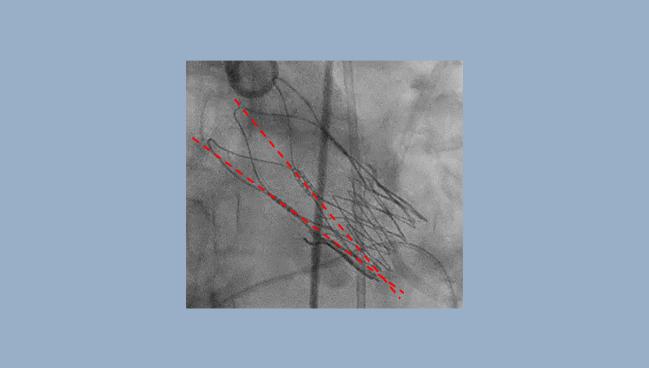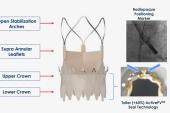Underexpanded Acurate Valves Come With Higher Stroke Risk, Study Confirms
Though the Acurate neo and neo2 valves are no longer available, there are lessons here for other self-expanding TAVI platforms.

Photo Credit: Adapted from Reardon MJ. A closer look at the ACURATE IDE study. Presented at: TCT 2024. Washington, DC.
Underexpansion of the Acurate neo and neo2 transcatheter heart valves (Boston Scientific) is tied to a greater risk for stroke, a Swiss study affirms.
The stroke rate was significantly higher in patients who had underexpanded versus fully expanded valves by 30 days (3.7% vs 1.3%; P = 0.04), with the difference in risk persisting through 7 years of follow-up, lead author Stefan Toggweiler, MD (Heart Center Lucerne, Switzerland), and colleagues report in a research letter published online this week in JACC: Cardiovascular Interventions.
The findings are consistent with an analysis from the US-based ACURATE investigational device exemption (IDE) trial which showed that the 1-year risk of all-cause mortality, stroke, or rehospitalization was higher in patients with underexpanded valves than in those whose valves were properly expanded.
Following the disappointing results of ACURATE IDE, in which the Acurate neo2 failed to show noninferiority compared with commercially available TAVI devices, and the subsequent analysis suggesting underexpansion might be to blame, Boston Scientific ended global sales of the valve.
But there are still lessons to be learned from the experience, Toggweiler told TCTMD.
“The idea that we just implant the valve and as long as there is no [paravalvular leak] and no big gradient, it’s fine, I think is probably not correct,” he said, stressing the need to aim for good expansion of the device. The evidence of a link between underexpansion and poor clinical outcomes, he added, “really puts the spotlight a bit on turbulence, stasis, and local flow patterns and their consequences. I think that’s an important message.”
For the current study, Toggweiler and colleagues examined data on 776 patients (mean age 82 years; 55% women) who underwent TAVI with the Acurate neo or neo2 valve at two tertiary referral centers in Switzerland between June 2015 and November 2024. Though predilatation was routinely performed, postdilatation was used only when there was a residual gradient or relevant paravalvular leak.
The investigators retrospectively assessed valve expansion on the final angiogram and defined underexpansion as the presence of at least one of the following findings:
- Nonparallel commissural posts
- Valve height greater than the width at the level of the upper crown
- Inflow width greater than at the upper crown
Underexpansion was initially seen in 34% of cases, but after postdilatation, 83% of valves were fully expanded and 17% remained underexpanded.
Despite similar patient characteristics, mean transvalvular gradients at discharge, and rates of new permanent pacemaker implants at 30 days in the underexpanded and fully expanded groups, stroke risk was higher in the presence of an underexpanded valve. This difference remained through long-term follow-up (HR 2.38; 95% CI 1.36-4.17) and was consistent for both the neo and neo2 devices.
The mechanism underlying the finding is not clear, but “recent bench testing suggests that underexpansion at frame level results in microinfolds of the porcine pericardium leaflets, which may result in local stasis and thus serve as a nidus for microthrombi formation,” Toggweiler et al write.
Similar data for other self-expanding TAVI devices are lacking. “However, compared with the Acurate, other valve frames are equipped with a less flexible outflow portion that may to some extent stabilize leaflets and prevent tissue infolds,” the investigators say. “Further research is needed to investigate the clinical relevance of transcatheter heart valve underexpansion across different platforms.”
There is also a question about how much underexpansion is tolerable, Toggweiler said, noting that more research in this area is needed.
Todd Neale is the Associate News Editor for TCTMD and a Senior Medical Journalist. He got his start in journalism at …
Read Full BioSources
Toggweiler S, Stolte T, Brunner S, et al. Stroke risk of underexpanded ACURATE neo and neo2 transcatheter heart valves. JACC Cardiovasc Interv. 2025;Epub ahead of print.
Disclosures
- Toggweiler reports having received honoraria from Medtronic, Boston Scientific, Biosensors, Edwards Lifesciences, Hi-D Imaging, Abbott Vascular, Medira, Shockwave, Teleflex, atHeart Medical, Cardiac Dimensions, Polares Medical, Amarin, Sanofi, AstraZeneca, Recor Medical, Daiichi Sankyo, Bayer, and Armira; having received institutional research grants from Edwards Lifesciences, Abbott Vascular, Boston Scientific, Fumedica, Novartis, Boehringer Ingelheim, and Polares Medical; and holding equity in Hi-D Imaging.





Comments